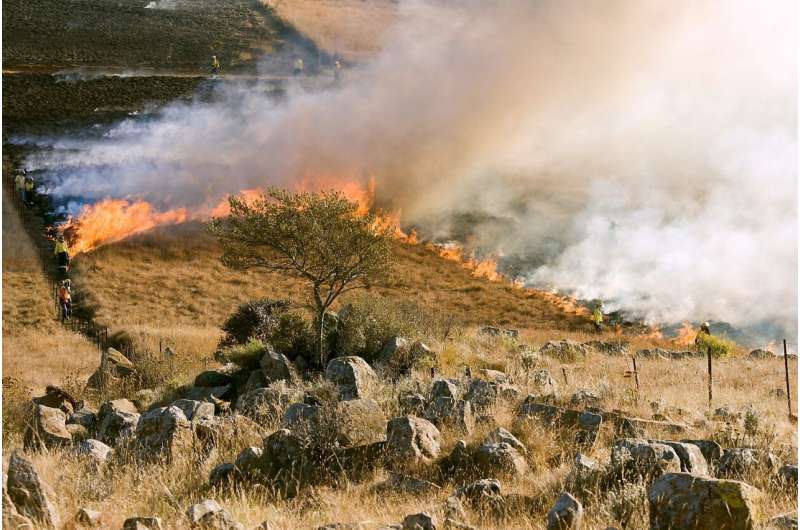How legal action can help the country better adapt to climate change


Image credit: Pixabay/CC0 Public Domain
As climate change leads to rising temperatures and reduced rainfall in southern Africa, studies suggest that forest fires are expected to increase in regions that are already hot, dry and water-scarce.
On July 12 and 13, 2024, massive wildfires broke out in the South African province of KwaZulu-Natal, killing six firefighters trapped in a fire and seven other people. The same fires killed 1,600 livestock and burned 14,000 hectares of land.
About 84% of all human settlements in South Africa are located in fire-dependent ecosystems – places where natural fires can contribute to ecosystem health by destroying ancient plant remains. However, when fires get out of control, the damage can also cause deaths and injuries. Infrastructure, industrial facilities, livestock, feed stocks, agricultural equipment, plantations, homes and recreational areas are often destroyed.
The main causes of forest fires in South Africa are:
- very dry and hot weather with temperatures above 42°C
- strong winds
- dry vegetation, such as deforested areas where branches, leaves and twigs are left lying around. Another cause is land infested with alien and invasive plant species that dry out quickly and then burn quickly.
- Depopulation of commercial agricultural areas because no one is available to fight forest fires when they break out
- Gentrification and resorts separated from residential communities so that there is no one there to fight fires when they break out
- New and unskilled people without the necessary firefighting skills move into fire-prone rural areas.
- Landowners who do not adapt their property to the increased fire risk and do not have fire extinguishing equipment on the property
- human error, such as throwing lit cigarettes out of a car window or carrying out dangerous activities on high fire risk days.
The aim of my research was to find out how many civil cases involving wildfires have been decided by South African courts since 1994 and whether these are related to global warming. The cases I found show how the rules for allocating liability for damage caused by wildfires are evolving. The cases relate to climatic conditions, such as rivers and other land conditions, that are much drier and hotter than normal.
I found that at least 22 wildfire lawsuits have been decided between 1997 and 2023. There is no climate change law yet that sets out how people who have suffered losses from climate-related fires can sue. But tort law, which sets out how to claim compensation for injuries and damages, and the National Veld and Forest Fire Act have been applied.
These lawsuits are important because if the courts uphold civil damages claims against negligent landowners, it should force landowners to comply with the law and take preventive measures. These court rulings could limit the number of wildfires that break out.
What does the law say?
In South Africa, forest fires are known as veld (open, natural grassland) fires. The Veld and Forest Fire Act states that landowners must have firefighting equipment, trained firefighters and protective clothing on hand. If they are not there, a responsible person must put out the fires and notify neighbours. Landowners are required to create firebreaks on their land to prevent the spread of fire, but there are broad ministerial powers to grant exemptions to landowners.
To sue for damages for a fire, it must be proven that the fire was caused intentionally or negligently. To claim damages, there must be quantifiable damage (e.g. loss of a home or breadwinner). The damage must also have been caused unlawfully.
Legally, it is about whether it is reasonable in society to hold someone liable for damage caused by wildfires. In some cases, courts have recognized that landowners did everything possible to fight wildfires that broke out because of hot and dry weather and quickly became unusually uncontrollable and ferocious.
But as the risks of climate change are better understood, wildfires are now more predictable. Landowners who fail to take precautions against wildfires will have a hard time arguing in court that they could not have foreseen a fire outbreak during a hot, dry period. Moreover, if they fail to maintain firebreaks, train staff or have firefighting equipment on site, they may fail the reasonableness test, especially on days when fire risk is high.
What I found
There are legal cases about the risks associated with climate change. In South Africa, the state has done a good job of establishing a regulatory standard against forest fires. This standard is becoming increasingly important for suing landowners or companies for failing to adapt to climate change as climate-related disasters such as forest fires and floods increase.
Failure to maintain a firebreak is also a crime. Further investigation is needed to determine whether negligent landowners have been prosecuted.
To date, plaintiffs in wildfire lawsuits have mainly been historically favored farmers or landowners making claims against other landowners, business owners, municipalities, the state transport company and even the Moravian Church. Claims have ranged from R74,000 (US$4,120) to R23 million (US$1.27 million) for burnt plantations, fynbos areas, sawmill stocks, farmland, farm fences, orchards, electrical lines and livestock.
I have not found any complaints from working-class communities whose huts or self-built shelters have been destroyed by fire, although there are many such cases. Since more people in these communities are affected by wildfires than commercial farmers, this is a clear gap.
Only two claims mentioned any environmental damage at all (one claim concerned captured lions and another the destruction of fynbos). Only three claims mentioned personal injury or the destruction of homes by forest fires.
Climate research has shown that the Southern African region is getting hotter and drier, and an increase in high fire risk days is inevitable. The way courts use existing laws to allocate liability for climate risks can reinforce preventive behavior and highlight important gaps that Parliament or the executive can then fill.
Provided by The Conversation
This article is republished from The Conversation under a Creative Commons license. Read the original article.![]()
Quote: Wildfires in South Africa will increase: How legal action can help the country better adapt to climate change (July 17, 2024), accessed July 17, 2024 from https://phys.org/news/2024-07-wildfires-south-africa-legal-action.html
This document is subject to copyright. Except for the purposes of private study or research, no part of it may be reproduced without written permission. The contents are for information purposes only.



